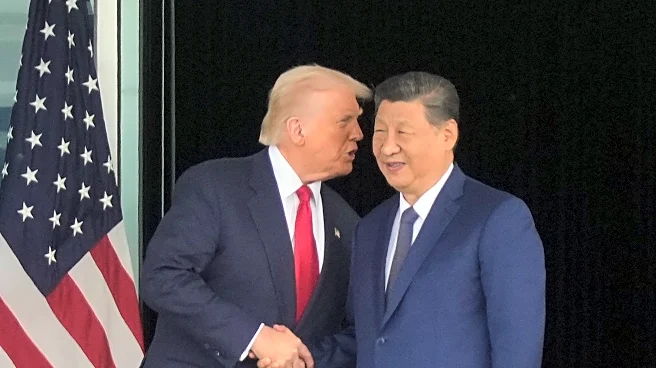WASHINGTON (AP) — In diplomacy, even short words matter. And with a brief Truth Social post, President Donald Trump may have revealed his approach to the U.S.-China relationship — to the delight of reputation-conscious
Beijing but to the worries of U.S. allies concerned with China's ascending global power.
“The G2 WILL BE CONVENING SHORTLY!" Trump wrote moments before he headed into a widely watched summit with Chinese leader Xi Jinping on Oct. 30 in South Korea, reviving a phrase that dates to the early 2000s but had been rejected by Washington for at least the past decade — including during Trump's first term.
G2, or Group of Two, was first proposed by American economist C. Fred Bergsten in 2005 to urge what he considered the necessity for the two major economies to talk to each other. It has come to imply a power equilibrium between the two nations — something that Beijing has long coveted as it ascended from regional powerhouse to pivotal global player.
But that equilibrium, and how China might approach it, stirs fears among U.S. allies and partners.
“The G2 concept implies that China and the United States are peers on the global stage and their positions should be given equal weight,” said Neil Thomas, a fellow on Chinese politics at the Asia Society Policy Institute.
Trump's use of the once-discarded term has come at a time when observers and analysts, including those advising Beijing, are deciphering his administration's China policy, which has yet to crystallize in the face of a more assertive Chinese government.
To understand the term’s significance beyond diplomatic circles, it’s important to look into China’s past.
From the beginning of the 20th century, even before its communist government took power, China objected to Western attempts to “contain” it. After World War II, the “containment policy” became a common way of describing a strategy the Chinese government felt was an institutionalized way of keeping it disempowered and in its place.
Much of Chinese diplomacy during the early 2000s was keyed to upending this pillar of the world order. Even today, China’s vaunted “ Belt and Road ” initiative is designed to spread Chinese influence and, in part, combat what used to be called containment.
In a weekend post, Trump called his “G2 meeting with President Xi of China” a great one for both countries, and wrote: “This meeting will lead to everlasting peace and success. God bless both China and the USA!" Defense Secretary Pete Hegseth repeated the term in an X post after he spoke with Chinese Defense Minister Dong Jun.
Mira Rapp-Hooper, a former Biden administration official, warned that Trump's use of the term will likely have "provoked significant anxiety in allied capitals, where allies fear that the Trump administration will cut deals with China that may leave them at a disadvantage.”
The term's new rise has pleased Bergsten, who said he never meant for the G2 to supplant other multilateral groupings or international organizations — such as the G7 or G20 — but to work out “the necessary cooperation between the two big superpowers.”
“It does not mean the U.S. and China telling the rest of the world what to do, or trying to dictate to the rest of the world," he said.
“I think (Trump) was using it as shorthand for the two biggest, most important economies getting together to talk about the whole range of global economic issues,” Bergsten told The Associated Press on Friday. “So it really, it is the vision that I had 20 years ago when I proposed the concept.”
Chinese commentators immediately picked up on Trump's use of G2 — and somewhat triumphally.
“Trump's G2, to some extent, is that the U.S. has accepted the reality that it no longer has the unipolar position but wants to build a bipolar world with China,” commented Housha Yueguang, a popular blog account known for its nationalist leanings. "It means Europe is no longer important, let alone Japan or India.”
The day after Trump posted the remark, a journalist for an Indian news service asked at a Chinese Foreign Ministry daily briefing whether the two countries were working for the creation of a G2 group, which the journalist said could change the world order.
Guo Jiakun, a ministry spokesperson, said the two countries "can jointly shoulder our responsibilities as major countries.” Guo adhered to Beijing's line that the country would “continue to practice true multilateralism" and “work for an equal and orderly multipolar world.”
Zhao Minghao, a Chinese scholar on China-U.S. relations, said the new G2 “does not mean China and the U.S. co-ruling the world,” nor does it mean that cooperation will replace competition in bilateral relations.
“It means the two countries will again examine the importance of the China-U.S. relations and be willing to conduct more communications and coordination," Zhao wrote in an article published on the Hong Kong news site hk01.com.
Bergsten said he proposed the concept 20 years ago when China was rising rapidly as an economic power and believed it was essential for the two countries — which he predicted would soon be the only two economic superpowers — to get together to “get any kind of progress on international economic issues.”
The term was discussed and pursued for a few years but faded when China and the United States diverged after the financial crisis.
Rapp-Hooper, who served as senior director for East Asia and Oceania at the National Security Council in the Biden administration, is now a partner at The Asia Group. She said the term was popularized in the early years of the Obama administration. It came, she said, from some senior officials who thought the two countries should define their relationship through cooperation to address global problems.
While China embraced the term, Washington came to discredit it because it implied that the United States and China would make major global decisions without other U.S. partners present, particularly its allies, she said.
“It is a term that plays very poorly in countries like Japan, Australia and India,” Rapp-Hooper said. “They hear the United States deferring to Chinese preferences in Asia, potentially at a cost to their interest.”
Kurt Campbell, deputy secretary of state in the Biden administration, said there were “real anxieties in Asia about the way the actual G2 was manifested.”
It wasn't just the notion that the countries were making decisions that would affect the region, said Campbell, now chairman of The Asia Group. “It was how China used the concept or the idea of it to make other surrounding nations feel insecure.”
It is a concept, he said, that “has been powerfully delegitimized.”










